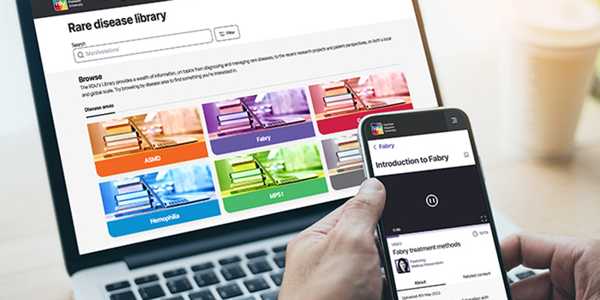Where to Locate Trustworthy Resources on Rare Diseases
Getting accurate, comprehensive information about rare diseases can be daunting. This guide is designed to direct you to the most authoritative resources and support groups explaining rare diseases' complexity.

Reliable Resources for Rare Diseases
Government and Official Health Websites
1. National Institutes of Health (NIH): The NIH's Office of Rare Diseases Research provides an extensive database and continually updated resources on rare diseases.
2. Centers for Disease Control and Prevention (CDC): The CDC is an excellent repository for rare disease information and provides detailed fact sheets and data.
3. World Health Organization (WHO): The World Health Organization International Classification of Diseases (ICD) is an excellent resource for rare disease resources.
Rare Disease Databases
1. Orphanet: Orphanet is a specialized portal for rare disease resources that contains comprehensive information from diagnosis to treatment options.
2. Genetic and Rare Disease Information Center (GARD): GARD provides comprehensive information on rare diseases, focusing on genetics and rare diseases.
3. Rare Disease Clinical Research Network (RDCRN): The RDCRN provides valuable resources and research opportunities on rare diseases and provides links to clinical trials and investigations.
Rare Disease Support Groups
Online Support Groups
1. RareConnect: RareConnect is a digital platform that connects individuals with rare disease support groups, enabling patients and families to share experiences and advice.
2. Facebook Groups: Numerous rare disease support groups provide a collaborative and supportive environment.
3. Reddit: Rare Disease Support Groups Reddit subreddits provide forums for discussion, inquiry, and mutual assistance.
Local and National Organizations
1. National Organization for Rare Diseases (NORD): NORD provides comprehensive resources and connects patients to local rare disease support groups.
2. Global Genes: Global Genes is an advocacy organization that provides information on rare diseases and connects patients to support systems.
3. Rare Diseases UK: This organization provides support and information on rare diseases specific to the UK, including access to rare disease support groups.
Academic Research Institutions
University Research Center
1. Harvard Medical School: Harvard University's research centre provides groundbreaking information on rare diseases through its published research and results.
2. Johns Hopkins University: Johns Hopkins University is well known for its rare disease research and provides essential resources on rare diseases.
3. Stanford University: Stanford University's Rare Disease Research Program provides comprehensive information on rare diseases and access to clinical trials.
Medical Journals and Publications
1. Journal of Rare Diseases: This journal publishes peer-reviewed articles containing information on rare diseases.
2. Orphanet Journal of Rare Medicines: This open-access journal provides comprehensive resources and research on rare diseases.
3. Medical Genetics: This journal contains detailed information on rare diseases, especially genetic ones.
Using Technology to Access Rare Disease Information
Mobile Apps
1. Rare Disease Advisor: This app provides a wealth of information on rare diseases and allows patients and caregivers to access resources easily.
2. RARE Toolkit: This toolkit provides rare disease resources specifically tailored for patients and healthcare professionals.
3. GARD Information Navigator: This app connects users to Genetic and Rare Disease Information Center resources.
Social Media and Forums
1. Twitter: Many rare disease organizations and advocates spread rare disease information via Twitter.
2. LinkedIn Healthcare professionals frequently share rare disease resources and updates on LinkedIn.
3. Quora: Find erudite discussions and competent answers about rare disease information.
Clinical Trial Registries
National Clinical Trials Databases
1. ClinicalTrials.gov: This registry provides an extensive database of publicly and privately funded clinical trials and is a valuable source of information on clinical trials for rare diseases.
2. EU Clinical Trials Registry: This registry provides access to EU clinical trial data and essential resources on rare diseases.
3. Australia New Zealand Clinical Trials Registry (ANZCTR): ANZCTR provides detailed records of clinical trials in Australia and New Zealand and has significantly contributed to information on rare diseases.
Rare Disease Specialty Research
1. Rare Disease Clinical Research Network (RDCRN) Research: RDCRN conducts rare disease clinical research and provides detailed resources on rare diseases.
2. International Rare Disease Research Consortium (IRDiRC): IRDiRC supports research initiatives to improve the understanding and treatment of rare diseases and provides comprehensive information on them.
3. Orphan Disease Center: This centre focuses on developing treatments for rare diseases and provides valuable resources for them.
Rare Disease Conferences and Workshops
Annual Meetings on Rare Diseases
1. World Orphan Drug Conference: This conference focuses on the pharmacological development of rare diseases and provides a wealth of information about them.

2. Global Genetic Rare Disease Patient Advocacy Summit: This annual summit provides a comprehensive platform for disseminating rare disease resources.
3. Rare Disease Day Events: These events are held worldwide to provide information on rare diseases and promote community awareness for those affected.
Expert Workshops
1. European Conference on Rare Diseases and Orphan Products (ECRD): ECRD is an essential forum for discussing and disseminating rare disease resources.
2. International Conference on Rare Diseases and Orphan Drugs (ICORD): This conference provides comprehensive information on rare diseases and promotes international collaboration.
Genetic Counseling Services
Comprehensive Genetics Clinics
1. Mayo Clinic Genetics and Rare Disease Clinic: Mayo Clinic offers a dedicated clinic that provides detailed information on rare diseases and genetic counselling services.
2. Cleveland Clinic Center for Personalized Genetic Care: This centre offers comprehensive rare disease resources and genetic counselling.
Telemedicine Genetic Counseling
1. Genomic Medicine: Genomic Medicine offers telemedicine genetic counselling and accessible rare disease resources.
2. InformedDNA: InformedDNA offers telemedicine genetic counselling services and important rare disease information.
Rare Disease Specialty Library
Medical Library
1. National Library of Medicine (NLM): NLM houses a vast collection of medical literature and provides comprehensive information on rare diseases.
2. British Library Medical Collection: This collection contains focused rare disease resources and provides a wealth of rare disease resources.
Digital Libraries
1. PubMed: PubMed provides a comprehensive database of medical research papers, including extensive information on rare diseases.
2. MedlinePlus: This resource provides accessible and reliable rare disease resources for patients and healthcare professionals.
Conclusion
In summary, access to reliable information and comprehensive rare disease resources is critical for patients, families, and healthcare professionals. Government websites, academic institutions, online rare disease support groups, and technology tools can significantly help patients navigate the complexity of rare diseases. These resources can also help individuals stay informed and connected and build a supportive community for rare disease patients.





